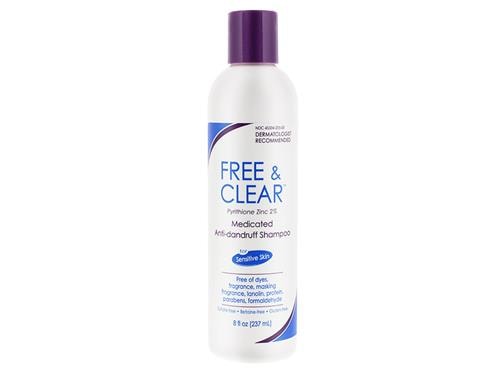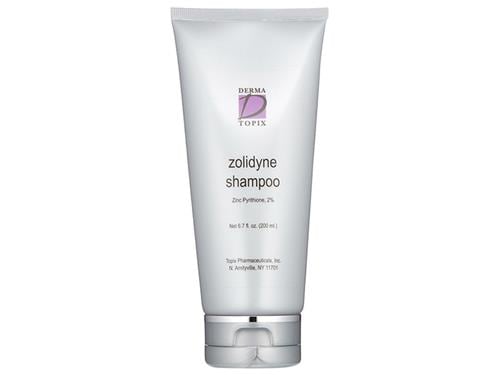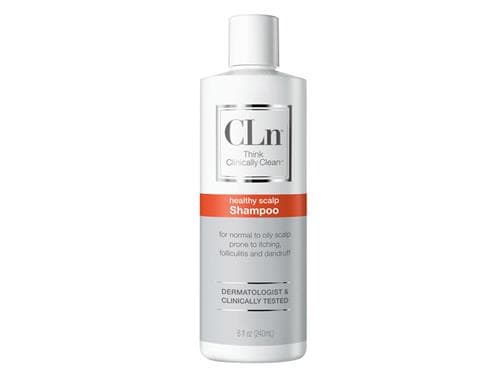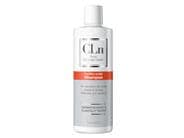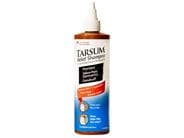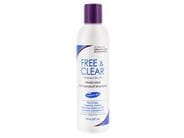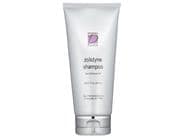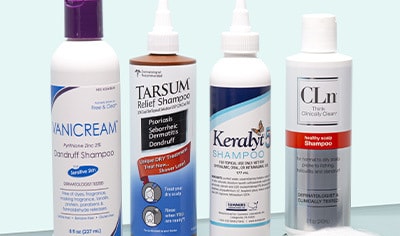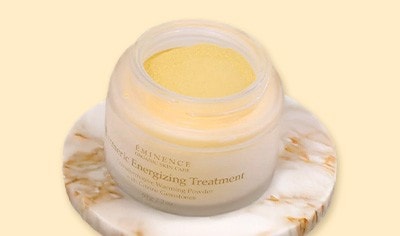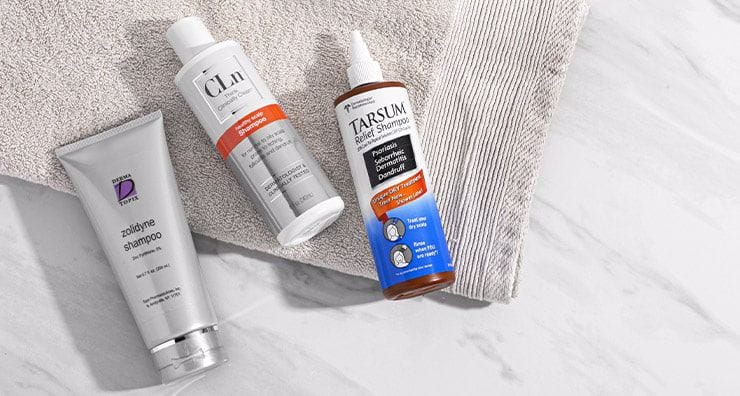
Taking care of your scalp is just as important as caring for the skin on the rest of your body. If you’ve noticed itchy or painful bumps or patches on your scalp, you’re probably wondering what they are and why they’ve popped up. It might be a common condition such as dandruff—which affects more than 40 percent of adults and is easily treated at home—or it could be a more serious condition that’s best treated by a doctor. Read on to find out what to look for and how best to treat five different kinds of scalp concerns.
Dandruff
What to look for: Itchiness and skin flakes on your scalp (or facial hair such as beard, brows or mustache) are common symptoms of mild dandruff. In a more severe case, you might also have scaliness or red patches on your scalp.
Possible causes: Stress, cold weather and dry skin can all contribute to dandruff, but there are other possible causes as well. Not shampooing often enough can cause oil and dead skin cells to build up on the scalp and contribute to flakiness. In other cases, dandruff can be caused by a fungus called Malassezia, or it can result from an allergic reaction to a new hair product.
Treatment recommendation: Because there are many possible causes of dandruff, it may take some troubleshooting to treat your case. If you’ve recently tried a new shampoo or hair product, you might try taking a break to see if your itchiness subsides.
If you currently shampoo your hair a few times a week, switching to a schedule of daily washing with your regular shampoo could help lessen mild dandruff. If you already shampoo daily or have moderate or severe dandruff, a medicated shampoo with active ingredients such as zinc pyrithione, salicylic acid or ketoconazole can help.
Free & Clear Medicated Anti-Dandruff Shampoo contains pyrithione zinc, an antimicrobial agent that makes the scalp less hospitable to Malassezia, clearing up dandruff with twice-weekly use. Because this shampoo’s 2% concentration of pyrithione zinc is stronger than the 1% in most over-the-counter drugstore dandruff shampoos, it’s likely to heal severe dandruff more effectively.
Psoriasis
What to look for: Scaly, crusty scalp patches that are itchy and red. Psoriasis also commonly appears on the knees and elbows.
Possible causes: Medical researchers don’t know for certain what causes psoriasis, but it is a malfunction of the immune system that spurs skin cells to regenerate more quickly than normal, piling up on the skin’s surface and resulting in scaly patches.
Psoriasis can also wax and wane over months or years and flare up because of environmental factors such as cold or dry weather, stress and the use of alcohol, tobacco and certain medications. There is a genetic component, as psoriasis runs in families. This means that if you have a parent, sibling or grandparent with psoriasis, your risk of developing it is higher.
Treatment recommendations: There is no cure for psoriasis, but lifestyle changes can help. If you can figure out what environmental triggers cause your psoriasis to flare up, such as dry weather or alcohol, then you can make changes accordingly, like using a humidifier at home or scaling back on drinking, to see if you notice an improvement.
Medicated shampoos with active ingredients such as coal tar and zinc pyrithione can also help with psoriasis. Board-certified dermatologist and LovelySkin CEO Dr. Joel Schlessinger recommends Derma Topix Zolidyne Shampoo, which contains zinc pyrithione to soothe scalp itchiness while leaving your hair soft and gently cleansed.
Dr. Schlessinger also recommends Tarsum Relief Shampoo, a tar-based shampoo that you apply directly to your scalp before showering. The bottle features an applicator tip that makes it easy to concentrate the shampoo on the areas of your scalp that need it most.
If shampoos aren’t easing your psoriasis symptoms, a dermatologist can also prescribe light treatments or prescription medication.
Folliculitis/Scalp Acne
What to look for: Pimple-like bumps on your scalp that are raised, red and may feel itchy or sore. Sometimes, folliculitis can include inflammation deeper within the skin, causing larger boils or clusters of boils called carbuncles.
The causes: When hair follicles become infected with fungi, a virus or bacteria (staph being the most common), folliculitis can result. A build-up of oil, skin cells or hair products such as dry shampoo can clog the pores on your scalp and lead to folliculitis, also called scalp acne by some. If you shave your head, ingrown hairs on your scalp can also lead to folliculitis.
Treatment recommendations: Just as you want to avoid popping or picking at pimples on your face, the same goes for folliculitis on your scalp. Medicated shampoos with salicylic acid, such as CLn Shampoo, can help clear away lingering dead skin cells and oils that can lead to folliculitis. For persistent folliculitis, a dermatologist can prescribe a sulfur-based treatment or a topical antibiotic, antifungal or steroid—or, in the case of larger boils or carbuncles, perform an in-office procedure to drain them.
Cysts
What to look for: A firm, flesh-colored round bump (or bumps) under the skin of the scalp that may (or may not) be tender to the touch.
The causes: The most common types of cysts on the scalp are pilar cysts and epidermoid cysts. Essentially, they are sacs filled with keratin, the protein found naturally in hair, nails and skin. Though their root cause is unknown, there may be a genetic factor at play with pilar cysts.
Treatment recommendations: These types of cysts are typically benign (non-cancerous), but you should visit a dermatologist for a diagnosis. “Depending on the size, location and condition of the cyst, your dermatologist can recommend whether to remove the cyst or just let it be,” Dr. Schlessinger says. “If you go with removal, it’s a procedure done in-office with local anesthetic and scarring is usually minimal.”
Skin Cancer
What to look for: Three types of skin cancer are commonly found on the scalp: basal cell carcinoma, melanoma and squamous cell carcinoma. These types of cancer can look like an irregular mole, a shiny bump, a red-hued patch or a sore that just won’t heal.
The causes: These types of skin cancer can develop on skin that is often exposed to the sun, and the scalp is an especially high-risk area for people with bald or shaved heads.
Treatment recommendations: A trip to the dermatologist’s office is the first place to start with these types of scalp bumps. They can examine the bump and determine whether it’s something innocuous like a mole or whether it needs to be biopsied to check for cancerous cells.
If you’re also wondering if your hair loss is normal or a cause for concern, learn more in our recent blog entry, called What Causes Hair Loss, and How Can I Stop It? Top Dermatologists Weigh In.
Shop this blog
Follow us on social
Follow us on social networks and be one of the first to learn about sales, giveaways, and free samples

